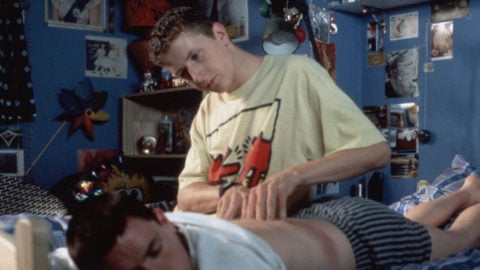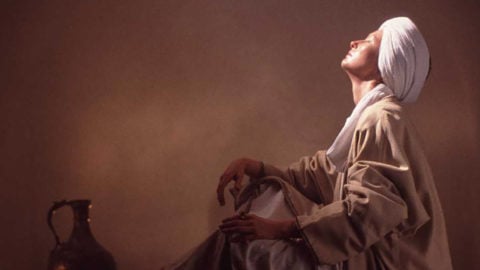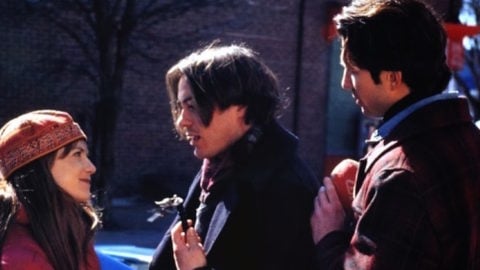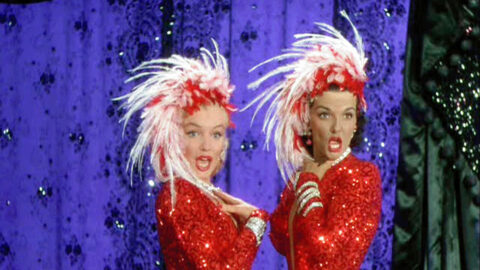Queer & Now & Then: 1993
In this biweekly column, I look back through a century of cinema for traces of queerness, whether in plain sight or under the surface. Read the introductory essay.
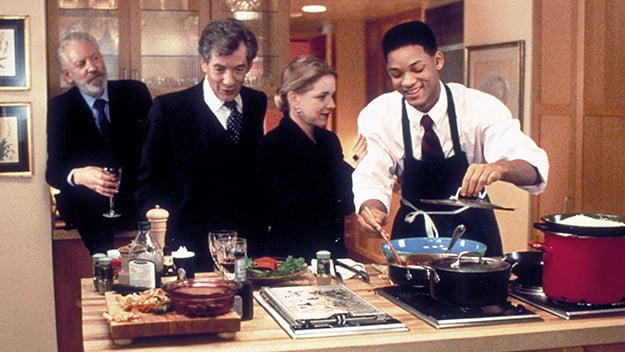
Images from Six Degrees of Separation (Fred Schepisi, 1993)
To get the overdiscussed out of the way: Fred Schepisi’s film version of John Guare’s play Six Degrees of Separation features one of cinema’s most laughably evasive gay kisses. As has been widely reported and mocked, Will Smith, fresh off The Fresh Prince of Bel-Air and protective of his burgeoning stardom, refused to lock lips with co-star Anthony Michael Hall during a crucial scene. The result is a flagrant and prototypical movie cheat, in which strategically placed backs of heads and judicious editing are meant to create the illusion that the two actors did the deed. Of course, no amount of film magic can really trick the viewer into seeing the opposite of what’s actually there: an obvious and not-at-all rare example of an actor’s attempt at self-preservation that expresses so very much about the puritanism and homophobia that have gone into so much Hollywood image-making for so long.
The botched kiss has always been particularly irritating, though, because of what it truly obscures: a fluid and altogether wonderful adaptation of Guare’s great, Pulitzer Prize–winning play, not to mention a nuanced, shape-shifting performance from Smith. Schepisi’s Six Degrees of Separation nimbly handles Guare’s wild tonal variations, balancing satire and tragedy, layering its many social touch-points with such grace, wit, and unblinking compassion that “race,” “class,” and “sexuality” don’t feel like “issues” so much as ever-present tessellations. Rather than opening out the play too much, Schepisi honors the text’s necessary staginess, especially in the first half, relying on fragmented editing and sudden flashes back or forward, to break up the action, an effect that feels not at all gratuitous and is in keeping with the zigzagging, intersecting lives of the many principal characters. As implied by the title, which has become a kind of parlor game divorced from its original context, Guare’s people—rich and poor, black and white, gay and straight—only exist in connection to one another, but Six Degrees of Separation isn’t about the relief or revelation of interconnectedness; rather it’s about the anxiety of closeness, of thirsting for union and sympathy and discovering unbridgeable divides.
Reprising her role from the original Broadway production, Stockard Channing refuses to turn Ouisa Kittredge, the story’s true protagonist, into a parody of a high-society dame. With a crooked, sly smile that undercuts her naturally patrician accent and air, Channing makes Ouisa into a bundle of barely detectable raw nerves—her life would seem to scream complacency, but Channing doesn’t let you forget, well before her dramatic, liberating final monologue, that there’s disquietude simmering beneath her placid surface. Ouisa shares a pornographically spacious Upper East Side apartment, perched high above Central Park, with her husband, Flan, both of them art dealers; the main living room is the showstopper, a vast, scarlet-drenched square that looks like Matisse’s “Red Studio” and is punctuated by the looming presence of an easeled two-sided Kandinsky painting that seems to flip between “chaos” (unruly, candy-colored blobs and slashes against egg-shell white) and “control” (floating pastel orbs in a sea of cool, unsettling gray) depending upon the emotional tenor of the scene. As a visual metaphor for the unknowability and doubled nature of the characters—everyone has two sides—the Kandinsky is durable and moving, and works better on film, where it serves as a kind of accent within a densely packed, exquisitely art-directed frame, than it did in the recent Broadway stage revival, where it almost overwhelmed the action, which otherwise took place in a kind of void. The apartment’s beauty, seductiveness, and comfortability, however false, is essential to the film, allowing us to sympathize with the outsider who so desperately wants to be a part of it.

So when Will Smith’s stranger comes to the door one night, seeking medical assistance for a stab wound from an alleged Central Park mugging, and claiming to know Ouisa and Flan’s children from Harvard, we may also want to enter this warm cocoon of affluence. Complicating matters, but ultimately to the benefit of everyone involved, Paul’s unexpected arrival comes while Ouisa and Flan are entertaining a white South African buyer, Geoffrey (Ian McKellen), in the hopes that they’ll make a major sale on a Cezanne. Paul’s blackness immediately stands out in this palace of whiteness, but believing his detailed accounts of their kids, the Kittredges let him in; he is, after all, wearing a blazer. After Ouisa tends to Paul’s light stomach wounds—a very brief electric charge passes between Channing and a shirtless, smirking Smith that stands as one of the film’s most sexually charged moments, the attraction between them containing multitudes of implications—the couple invite him to join the three of them for dinner. Paul suggests they stay in, offering to cook as thanks for taking care of him—which of course gives him the chance to further luxuriate in the apartment, the real reason for his arrival. Though he’s already wildly appealing, this oh-so-articulate, literate, charming young man is about to become even more of a catch: his full name is Paul Poitier, son of Sidney.
Today a quick Google search would clear up any lingering doubts about the veracity of Paul’s claim; Ouisa and Flan seem to show no hesitation in believing Paul, though. Why, after all, should they distrust this handsome, upstanding man with a minutely detailed back story, given to brilliant soliloquies based on his senior thesis (which he claims was stolen by the mugger) on The Catcher in the Rye and the power of the imagination. Lest we think that the Kittredges are drawn as preposterously gullible, Guare’s narrative is based on a real incident, in which various people, including a wealthy New York couple—a Newsweek editor and his socialite wife—were hoodwinked by a con man claiming to be the son of Sidney Poitier. The Kittredges’ excitement about this revelation makes them targets for cutting satirical drama because of the status of the eternal Oscar-winning movie star: his widespread acceptance within popular culture as a black actor and artist of allegedly singular talents has long been analyzed as an example of black exceptionalism, his success and relative power in the industry, in other words, communicating as much about white American racism as black American progress. We come to discover, later in the film, that Paul was not very long ago homeless on the streets of Boston, and he has been pulling the same routine with a group of upper-crust families, all connected via their Ivy League–attending kids. Most perplexing is the supposed goal of Paul’s con: he doesn’t steal from anyone, he just seems to want access.
Fascinatingly, Guare is not content to simply mark Paul as an outsider to this privileged world through his blackness or his poverty; Paul is further queered by his homosexuality, which is discovered by Ouisa in the most direct way possible. The morning after their extended, lovely night of elegantly plated pasta and enriching conversations about the life of the mind, Ouisa enters her son’s bedroom, where they had allowed Paul to crash for the night, and where she finds Paul in flagrante delicto with another man, a street hustler who proceeds to run circles around that formerly pristine living room completely in the nude. “You brought this thing into our house?” Ouisa screams before she and Flan summarily kick out Paul, who can barely eke out “I’m so sorry” before the door slams in his face. It’s very much worth remembering that at this point in the narrative, Ouisa and Flan still believe Paul to be the son of the most famous black American screen actor of all time. Their horror and disgust over his sexual transgression supersedes all other matters, including the chance to hobnob with Sidney Poitier, or maybe to appear as extras in the upcoming film of Andrew Lloyd Webber’s Broadway musical Cats, which Paul has claimed is his father’s next project. Allowing a sex worker—and a gay one at that—to cross the threshold of this easily breached apartment is the bridge too far.
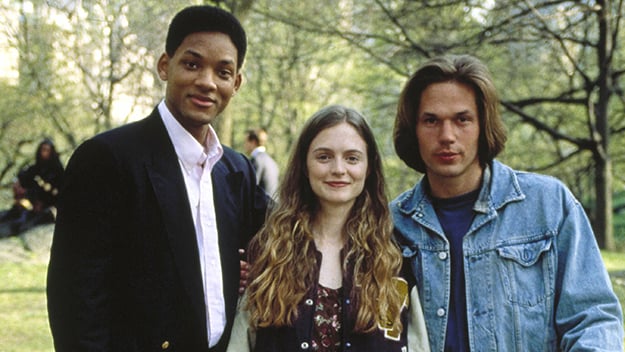
Sex is the key that helps unlock the network of confidences that makes up the remainder of Guare’s tale. Paul’s appeal resides only partly in his fabrications; he’s also a highly sexual person, which Guare uses to humanize—rather than further “other”—an otherwise purposely inchoate character. Near the end of the film, during only their second, and likely last, conversation, Ouisa asks Paul why he brought home the hustler; his response is unambiguous and heartbreaking: “I was so happy I wanted to add sex to it.” A joy-seeker desperate to rise above his “station,” Paul is nevertheless not so driven that he cannot pause for discreet liaisons. Having told Ouisa that first night in the kitchen that it “gives me a thrill to be looked at,” he has also outed himself as an exhibitionist, and was perhaps hoping to get caught in the act in bed. Later, Paul wields sex as a weapon, such as when he manipulates his way into the lives of a young bohemian couple, Elizabeth and Rick (Heather Graham and Eric Thal), promising them show business connections before sexually seducing the ostensibly hetero Rick, following a date and bold same-sex tango at the Rainbow Room—another example of Paul’s need to perform his queerness in plain sight for the white, straight elite. After fucking Rick (which Rick tells Elizabeth was “fantastic”), Paul encourages him to drain their bank account so he can borrow some money. Strapped for cash, Rick later throws himself out his apartment window.
So back to the kiss: it’s the sexual brazenness of Paul that sits most at odds with Smith’s timid reluctance. The scene comes partway through the film, in flashback, providing the central piece of the puzzle to help unlock Paul’s con man origin story. Back in Boston, Anthony Michael Hall’s meek Harvard computer geek Trent Conway had been the Henry Higgins to Paul’s Eliza Doolittle, whom he had met on the street one stormy night and taken in. In addition to instructing Paul in the ways of pronouncing “sofa” and “pot of jam” (a gift rich people love), Trent proceeds to supply him with names, addresses, and crucial details of his acquaintances’ parents back in New York in exchange for sexual favors. Thus the kiss between Paul and Trent is not incidental. By not allowing their lips to meet, the film misses out on sufficiently communicating this complex power move on the part of both men, as well as a moment of erotic catharsis that effectively sets the part in motion.
One might wish to point to this oft-cited episode as an example of how backwards and unenlightened American movie stars were in the ’80s, and Smith expressed regret over not agreeing to kiss Hall mere months after shooting the film: “It was very immature on my part. I was thinking, ‘How are my friends in Philly going to think about this?’ I wasn’t emotionally stable enough to artistically commit to that aspect of the film.” Yet can one imagine Smith, or any other megastar of his caliber, engaging in a gay smooch even today? While in most quarters of contemporary culture, such a gesture would be rewarded as brave rather than make him a pariah, the likelihood is slim, reminding us that when it comes to queer representation in contemporary mainstream cinema, it would be best not to look back on such decades-old disappointments with too much cultural superiority. The only real difference between then and now is that in 2019 an actual film version of Cats is imminent.
At the same time, this strange and sad evasion, this missed opportunity, somehow functions in context. After all, Paul, who wants nothing more than to be an inside man, to be accepted, to be loved and to be understood, is perhaps most defined by false confidence. Despite his strut, he’s as insecure as Ouisa, as any of us. Smith’s inability to perform this kiss demonstrates the vulnerability of an apparently strong-willed superstar. In this moment, Smith’s and Paul’s fear and trembling become one.
Michael Koresky is a writer, editor, and filmmaker in Brooklyn. He is cofounder and editor of the online film magazine Reverse Shot, a publication of Museum of the Moving Image; a regular contributor to the Criterion Collection and Film Comment, where he writes the biweekly column Queer & Now & Then; and the author of Terence Davies, published by University of Illinois Press, 2014.



